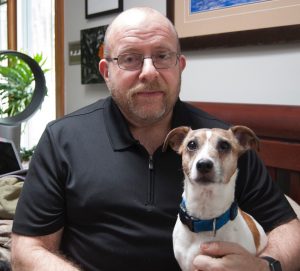For a while now, I've been worried about memory lapses. About big vacant holes where my memories should live.
For example, I completely forgot that one of my best friends growing up also worked for me at the school newspaper at Penn State. I all too often looked at my sister with blank stares when she described her memories of our family life; I just don’t remember the stories.
But I didn't rush off for testing because I didn't think anything could be done about my memory. And besides, I'm only in my mid-50s and that is awfully young for Alzheimer's or dementia, isn’t it?
About a year ago, my sister saw a research study notice for a drug that has shown some success in slowing down the progression of memory loss. I took the online test and "passed" on to a telephone conversation. I "passed" that, too, and soon found myself in a medical research office in suburban New Jersey – giving lots of blood, having an EKG and being poked and prodded by a neurologist.
The key test was the RBANS (Repeatable Battery for Neuropsychological Status), a series of mini-memory and cognitive tasks. I needed to score an 85 or less to get into the trial; the research coordinator told me that, based on our conversation, she really didn't expect me to “pass.”
She then came back with the news that I scored a 71, much lower than the number needed to qualify for the trial. Soon I was meeting with the director of research and hearing the news that more testing was needed, but that it was very likely that something serious was wrong. A subsequent PET scan confirmed it: I do indeed have younger-onset Alzheimer’s.
Am I terrified? Absolutely. More than a bit numb? Yep. Determined to do what I can for myself and for others? Even more so.
I'm told that my level of memory loss and cognitive impairment is considered mild to moderate. I'm proudly participating in a clinical trial for a drug which has shown promise in slowing the progression of the disease, particularly in folks in the early stages of Alzheimer's.
In addition to participating in the clinical trial, I’m also joining others in the Alzheimer’s community to chronicle this disease and my fight against it. My first article appeared in today's edition of The New York Times, and I’m hopeful that the paper will periodically publish more pieces about my experiences and my fight.
Most importantly, I'm reaching out to others with the hope that it will help me overcome the overwhelming wave of fear that sometimes hits me. For example, I was just chosen to serve on the Alzheimer’s Association National Early Stage Advisory Group, a group composed of people in the early stages of Alzheimer's disease who help raise awareness and advocate for others living with dementia.
I want to learn as much as possible so I can become an effective advocate. Yes, I have a story to tell, but these days – to be as effective as possible – we need to share the facts and find ways to reach as many people as we can.
I'm going to fight, just like I fought for our civil liberties and the environment throughout my career. Just like I’ve fought diabetes and the clinical depression that I've lived with for most of my life.
At the end of the day, I hope to be the same guy I've been for quite some time. Perhaps I’m a bit more forgetful about some things – remembering names, handling simple math and figuring out directions are increasingly difficult – but I’m already more willing to slow down and appreciate the world around me. And that’s not such a bad thing.
About the Author: After graduating from Penn State University, Phil Gutis started at The New York Times as a copy boy and earned promotion through the clerical ranks until he was selected as a reporter trainee and then full-time reporter. After journalism, Phil transitioned into advocacy and for several decades established and managed multi-million dollar communications programs for large advocacy organizations including the Natural Resources Defense Council and the American Civil Liberties Union. Phil currently manages the Prallsville Mills, an early industrial village along the Delaware River in Stockton, NJ.